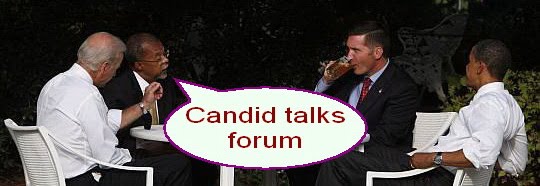 President Obama's first year in office
President Obama's first year in officePresident Barack Obama marks his first year in the White House this week. The good feelings that surrounded him in the months after Inauguration Day a year ago have faded. Since January 2009, Obama has signed an economic stimulus bill, pushed Congress to pass health-care reform, traveled overseas and upheld traditions like the White House Easter Egg roll and a State Dinner.
By Kathleen Parker
Wednesday, June 30, 2010
If Bill Clinton was our first black president, as Toni Morrison once proclaimed, then Barack Obama may be our first woman president.......
Obama shows he's the one in command!
Phew! That was fun. Now, if you'll just keep those hatchets holstered and hear me out.
No, I'm not calling Obama a girlie president. But . . . he may be suffering a rhetorical-testosterone deficit when it comes to dealing with crises, with which he has been richly endowed.
It isn't that he isn't "cowboy" enough, as others have suggested. Aren't we done with that? It is that his approach is feminine in a normative sense. That is, we perceive and appraise him according to cultural expectations, and he's not exactly causing anxiety in Alpha-maledom.
We've come a long way gender-wise. Not so long ago, women would be censured for speaking or writing in public. But cultural expectations are stickier and sludgier than oil. Our enlightened human selves may want to eliminate gender norms, but our lizard brains have a different agenda.
Women, inarguably, still are punished for failing to adhere to gender norms by acting "too masculine" or "not feminine enough." In her fascinating study about "Hating Hillary," Karlyn Kohrs Campbell details the ways our former first lady was chastised for the sin of talking like a lawyer and, by extension, "like a man."
Could it be that Obama is suffering from the inverse?
When Morrison wrote in the New Yorker about Bill Clinton's "blackness," she cited the characteristics he shared with the African American community:
"Clinton displays almost every trope of blackness: single-parent household, born poor, working-class, saxophone-playing, McDonald's-and-junk-food-loving boy from Arkansas."
If we accept that premise, even if unseriously proffered, then we could say that Obama displays many tropes of femaleness. I say this in the nicest possible way. I don't think that doing things a woman's way is evidence of deficiency but, rather, suggests an evolutionary achievement.
Nevertheless, we still do have certain cultural expectations, especially related to leadership. When we ask questions about a politician's beliefs, family or hobbies, we're looking for familiarity, what we can cite as "normal" and therefore reassuring.
Generally speaking, men and women communicate differently. Women tend to be coalition builders rather than mavericks (with the occasional rogue exception). While men seek ways to measure themselves against others, for reasons requiring no elaboration, women form circles and talk it out.
Obama is a chatterbox who makes Alan Alda look like Genghis Khan.
The BP oil crisis has offered a textbook case of how Obama's rhetorical style has impeded his effectiveness. The president may not have had the ability to "plug the damn hole," as he put it in one of his manlier outbursts. No one expected him to don his wetsuit and dive into the gulf, but he did have the authority to intervene immediately and he didn't. Instead, he deferred to BP, weighing, considering, even delivering jokes to the White House Correspondents' Association dinner when he should have been on Air Force One to the Louisiana coast.
His lack of immediate, commanding action was perceived as a lack of leadership because, well, it was. When he finally addressed the nation on day 56 (!) of the crisis, Obama's speech featured 13 percent passive-voice constructions, the highest level measured in any major presidential address this century, according to the Global Language Monitor, which tracks and analyzes language.
Granted, the century is young -- and it shouldn't surprise anyone that Obama's rhetoric would simmer next to George W. Bush's boil. But passivity in a leader is not a reassuring posture.
Campbell's research, in which she affirms that men can assume feminine communication styles successfully (Ronald Reagan and Bill Clinton), suggests holes in my own theory. She insists that men are safe assuming female styles as long as they meet rhetorical norms for effective advocacy -- clarity and cogency of argument, appropriate and compelling evidence, and preempting opposing positions.
I'm not so sure. The masculine-coded context of the Oval Office poses special challenges, further exacerbated by a crisis that demands decisive action. It would appear that Obama tests Campbell's argument that "nothing prevents" men from appropriating women's style without negative consequences.
Indeed, negative reaction to Obama's speech suggests the opposite. Obama may prove to be our first male president who pays a political price for acting too much like a woman.
And, perhaps, next time will be a real woman's turn.

No comments:
Post a Comment